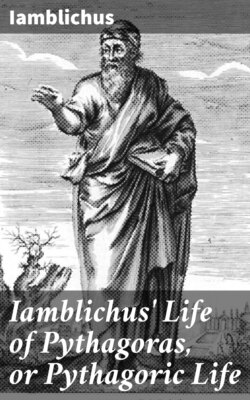Читать книгу Iamblichus' Life of Pythagoras, or Pythagoric Life - Iamblichus - Страница 11
На сайте Литреса книга снята с продажи.
CHAP. VII.
ОглавлениеTable of Contents
It remains therefore after this, that we should relate how he travelled, what places he first visited, what discourses he made, on what subjects, and to whom they were addressed; for thus we shall easily apprehend the nature of his association with the men of that time. It is said then, that as soon as he came to Italy and Sicily, which cities he understood had oppressed each other with slavery, partly at some distant period of past time, and partly at a recent period, he inspired the inhabitants with a love of liberty, and through the means of his auditors, restored to independence and liberated Crotona, Sybaris, Catanes, Rhegium, Himæra, Agrigentum, Tauromenas, and some other cities, for whom also he established laws, through Charondas the Catanæan, and Zaleucus the Locrian, by whom they became florishing cities, and afforded an example worthy of imitation, for a long time, to the neighbouring kingdoms. He also entirely subverted sedition, discord, and party zeal, not only from his familiars, and their posterity, for many generations, as we are informed by history, but, in short, from all the cities in Italy and Sicily, which were at that time disturbed with intestine and external contentions. For the following apothegm was always employed by him in every place, whether in the company of a multitude or a few, which was similar to the persuasive oracle of a God, and was an epitome and summary as it were of his own opinions; that we should avoid and amputate by every possible artifice, by fire and sword, and all-various contrivances, from the body, disease; from the soul, ignorance; from the belly, luxury; from a city, sedition; from a house, discord; and at the same time, from all things, immoderation: through which, with a most fatherly affection, he reminded each of his disciples of the most excellent dogmas. Such therefore was the common form of his life at that time, both in words and actions. If, however, it be requisite to make a more particular relation of what he did and said, it must be observed, that he came to Italy in the sixty-second Olympiad, at which time Eryxidas of Chalcis conquered in the stadium. But immediately on his arrival he became conspicuous and illustrious, in the same manner as before, when he sailed to Delos. For there, when he performed his adorations at the bloodless altar of the father Apollo, he was admired by the inhabitants of the island.
